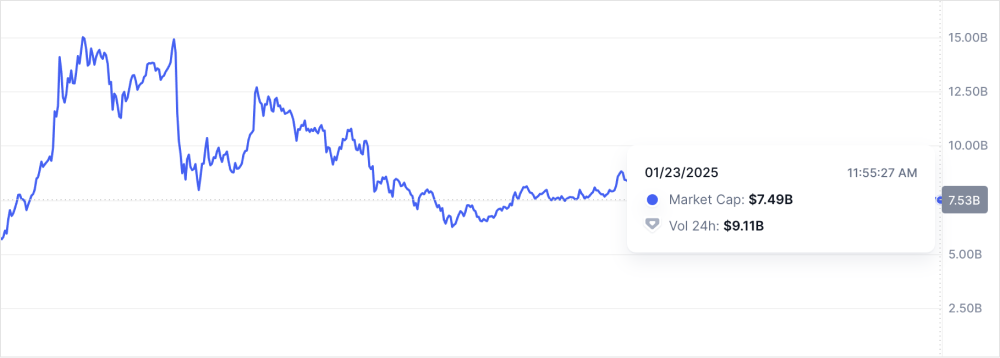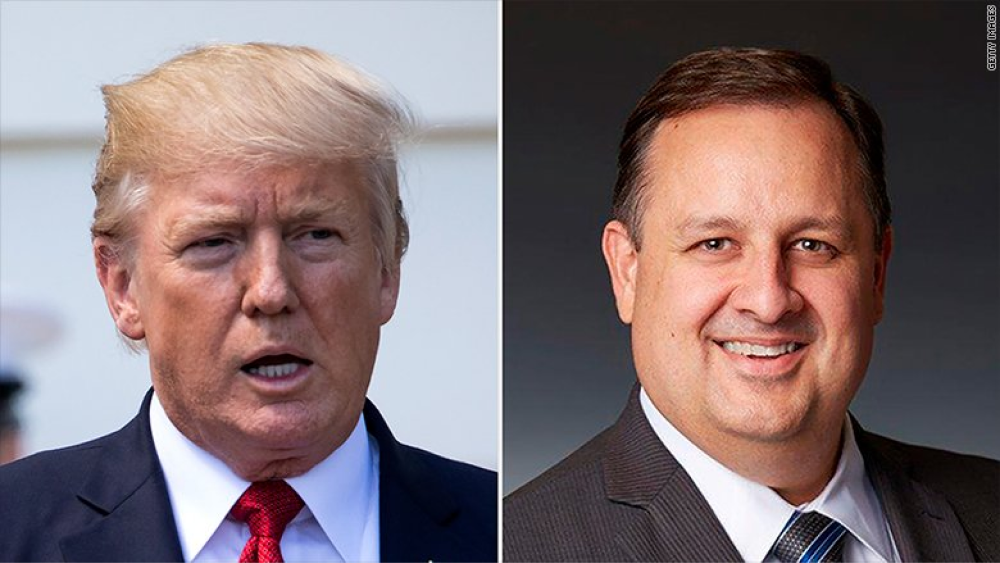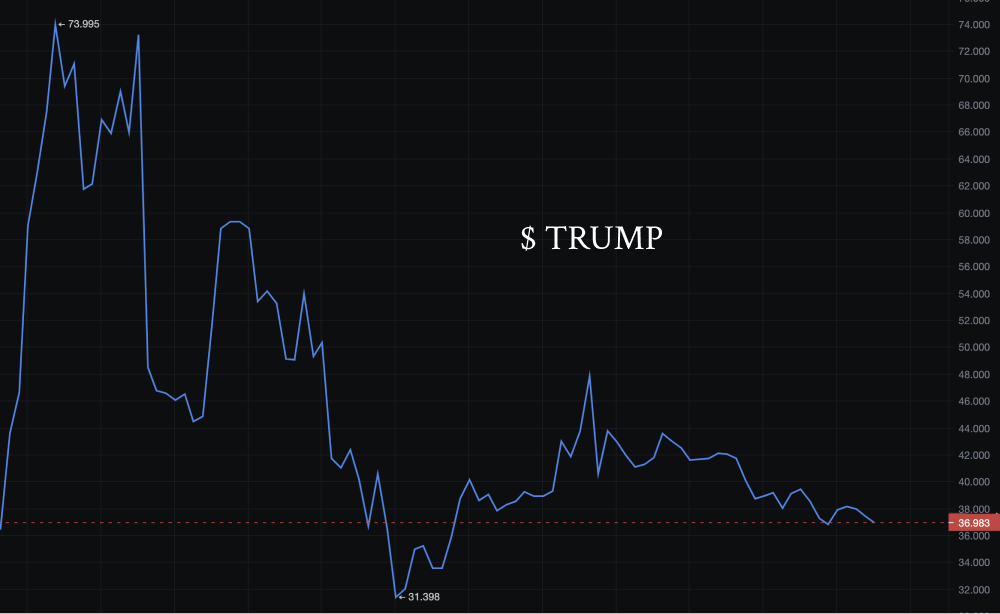On January 17, U.S. President Trump issued a personal theme token, $TRUMP, through his company CIC Digital, causing a significant upheaval in global financial markets. The token's market capitalization soared to $15 billion on its first day, but by January 23, it had plummeted to $7.5 billion, marking a 50% drop in just one week. The Trump family's control of 80% of the token supply, along with the deep intertwining of political power and financial interests, is becoming a hallmark case of power in the digital age.

I. Ethical and Legal Storm: The Cryptographic Monetization of Presidential Power
- Conflict of Interest Escalates to Constitutional Level
- Family Ownership Controversy: Blockchain analysis platform Arkham shows that out of a total supply of 1 billion $TRUMP tokens, 800 million are held by CIC Digital and Fight Fight Fight LLC, controlled by the Trump family, with a three-year lock-up period. If Trump pushes for relaxed crypto regulations during his term, he could directly manipulate the token's value, potentially violating Article 1, Section 9 of the U.S. Constitution's "Emoluments Clause."
- Emergency Meeting of the White House Ethics Committee: Former White House ethics advisor Walter Shaub called this move "the most blatant corruption by a public official" and urged Congress to initiate impeachment proceedings. The oversight organization "Government Accountability Project" pointed out that the token's anonymity could open new channels for foreign entities to funnel political donations.

- Legal Games in a Regulatory Vacuum
- SEC's Silence and Pressure: New SEC Chair Paul Atkins refused to intervene, citing "meme coins are not securities," but MIT scholar Gary Gensler (sharing a name with the former SEC chair) pointed out that $TRUMP profits from political influence, meeting the definition of a security under the Howey Test. Former SEC Chair Jay Clayton warned, "The president's direct involvement in token issuance touches on the gray area of the constitutional anti-corruption clause."
- Accelerated Legislative Pushback: Democratic Congressman Ro Khanna introduced the "Politician Crypto Asset Ban" (H.R.8921), which seeks to prohibit public officials from issuing or holding related tokens, with violators facing up to 20 years in prison. The nonprofit organization "Citizens for Responsibility and Ethics in Washington" (CREW) has sued Trump for violating the "Anti-Corruption Act," with the case accepted by the U.S. Supreme Court, becoming the first crypto constitutional case.
II. Market Turmoil: Retail Frenzy and Systemic Collapse
- Price Rollercoaster Triggers Chain Liquidations
- Extreme Volatility Records: The price of TRUMP surged from its issuance price of $0.1824 on January 17 to about $74 on January 19. However, following the launch of the MELANIA token by his wife, TRUMP faced a sell-off, plummeting 46.5% to $33.46 within 24 hours, resulting in $750 million in liquidations across the network. Former Coinbase executive Nick Tomaino criticized the Trump family's control of 80% of the token supply as "predatory design," leading many to potentially lose their investments.
- Latin American Market Collapse: Tokens like "Trump2.0" and "MAGA" emerged in Mexico and Argentina, causing over 370,000 retail investors to face liquidations due to leveraged trading, prompting the Brazilian central bank to urgently suspend fiat channels for crypto exchanges. Hedge fund manager Jim Chanos predicted that Trump's term would become "the golden age of fraud," pointing out the systemic risks inherent in the token's highly centralized structure.

- Industry Division: The Anger of Idealists and Capitalist Revelry
- Technologists Protest: Ethereum founder Vitalik Buterin condemned $TRUMP for "betraying the decentralized spirit of blockchain," calling it "an erosion of the crypto world." Dragonfly Capital partner Rob Hadick labeled it "a stain on the industry," urging practitioners to repair the damage to their reputation.
- Speculators and Political Alignments: BitMEX founder Arthur Hayes viewed Trump's token issuance as marking the "opening of the political meme coin market," suggesting that any politician could follow suit in the future. The Solana Foundation reported a 320% surge in on-chain trading volume due to the token, with its market cap surpassing $159.2 billion, entering the top 80 of U.S. stocks, and publicly supporting Trump's token issuance as "a milestone in crypto innovation."
- Capital's Political Donation Race: Crypto giants like a16z and Ripple Labs donated $31 million to Trump's campaign team, far exceeding the Democratic Party's $4.7 million, attempting to secure policy benefits such as "stablecoin regulatory exemptions."
III. Global Regulatory Emergency Response: Reconstruction of Geopolitical Financial Order
- Surge in Cross-Border Money Laundering Risks
- EU Launches Criminal Investigation: Europol has tracked that 12% of $TRUMP's on-chain transactions flow to addresses in Russia and North Korea, suspected of being tools for evading sanctions. The European Parliament plans to amend the "Anti-Money Laundering Directive" to enforce KYC real-name systems for politician tokens.
- Defensive Lockdown in Asia: Japan's Financial Services Agency ordered 30 exchanges to delist $TRUMP; Singapore's Monetary Authority froze $120 million in assets from CIC Digital and placed it on the "prohibited trading entities list."
- Currency Sovereignty Crisis in Developing Countries
- Turkish Lira Devalued by 9.3% in One Week: Due to citizens selling their local currency to chase $TRUMP, the Turkish central bank raised interest rates to 65% but still failed to curb capital outflow, with the IMF warning of "risks of losing currency sovereignty." Jia Ning from the Blockchain Committee of the China Communications Industry Association warned that Trump's token issuance could "entice more public figures to follow suit, monetizing their influence as tokens," exacerbating market speculation.
IV. Historical Inquiry: Checks and Balances of Power in the Digital Age
- Constitutional Mechanisms Face Technological Challenges
- A Harvard University research report indicated that if a president can monetize policy influence through tokens, the traditional "separation of powers" system will fail, and "executive power may evolve into algorithmic dictatorship."
- The U.S. Supreme Court accepts the first crypto constitutional case: The nonprofit organization CREW has sued Trump for violating the "Anti-Corruption Act," case number 24-567, with a hearing expected in October 2025.
- Reconstruction of Global Governance Framework
- G7 Emergency Summit Proposal: Aiming to establish a "cross-border monitoring network for politician crypto assets," authorizing the Bank for International Settlements (BIS) to freeze non-compliant assets on-chain and mandating the disclosure of leaders' relatives' crypto holdings.
- Wang Yingbo from the Shanghai Academy of Social Sciences pointed out that the U.S. move is essentially to consolidate dollar hegemony, while Trump's token issuance exposes the "arbitrage logic of power in the digital age," potentially undermining the currency sovereignty of weaker nations.
Conclusion
The Wall Street Journal commented: "As computing power becomes the new oil, the president's issuance of tokens may redefine the political economy of the 21st century."
Financial Times editor Lu La Halaf warned: "When a president turns his name into a tradable hash value, the core of democratic institutions is being repriced."
The outcome of this mad experiment may determine the ultimate form of financial and political order in the 21st century.
Disclaimer: The above content is for reference only and does not constitute investment advice.
If you have any questions, you can contact us through the following official channels:
AiCoin Official Website: www.aicoin.com
Telegram: t.me/aicoincn
Twitter: x.com/AICoincom
Email: support@aicoin.com
Group Chat: Customer Service Yingying、Customer Service KK
免责声明:本文章仅代表作者个人观点,不代表本平台的立场和观点。本文章仅供信息分享,不构成对任何人的任何投资建议。用户与作者之间的任何争议,与本平台无关。如网页中刊载的文章或图片涉及侵权,请提供相关的权利证明和身份证明发送邮件到support@aicoin.com,本平台相关工作人员将会进行核查。




